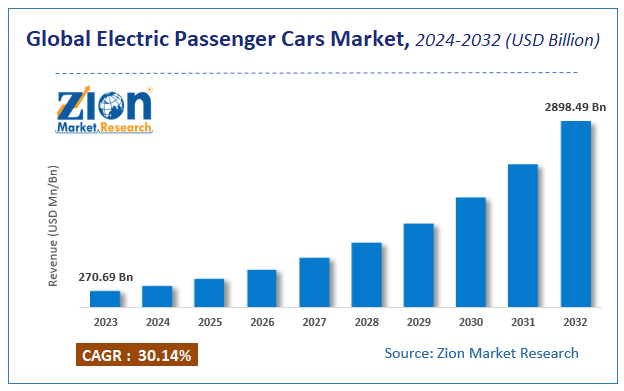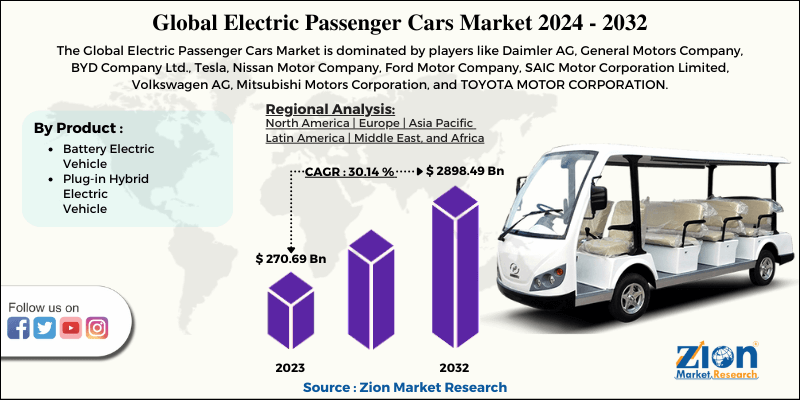Electric Passenger Cars Market Size, Share, Trends, Opportunities Analysis Forecast Report by 2032

Electric Passenger Cars Market Size -By Product (Battery Electric Vehicle and Plug-in Hybrid Electric Vehicle), And By Region- Global Industry Perspective, Comprehensive Analysis, and Forecast 2024 - 2032-
| Market Size in 2023 | Market Forecast in 2032 | CAGR (in %) | Base Year |
|---|---|---|---|
| USD 270.69 Billion | USD 2898.49 Billion | 30.14% | 2023 |
Electric Passenger Cars Market Insights
According to a report from Zion Market Research, the global Electric Passenger Cars Market was valued at USD 270.69 Billion in 2023 and is projected to hit USD 2898.49 Billion by 2032, with a compound annual growth rate (CAGR) of 30.14% during the forecast period 2024-2032.
This report explores market strengths, weakness, opportunities, and threats. It also provides valuable insights into the market's growth drivers, challenges, and the future prospects that may emerge in the Electric Passenger Cars Market industry over the next decade.
Electric Passenger Cars Market Size
The report offers an assessment and analysis of the Electric Passenger Cars market on a global and regional level. The study offers a comprehensive assessment of the market competition, constraints, revenue estimates, opportunities, evolving trends, and industry-validated data. The report provides historical data from 2017 to 2022 along with a forecast from 2024 to 2032 based on revenue USD Billion.
Electric Passenger Cars Market: Overview
Electric vehicles are multibillion-dollar avenues for the utility sector and electric passenger cars are no exception to this. Reportedly, one-fourth of cars on the roads will be of electric type by 2030. With over two million electric vehicles sold across the globe during 2019 and electric cars accounting for nearly 2.5% of the overall light vehicle market share in the same year, the market for electric passenger cars is anticipated to gain traction in the years to come.
Demand for producing fuel-efficient vehicles with a need for reducing carbon footprints will create new growth opportunities for the electric passenger cars industry in the foreseeable future. An increase in crude oil prices and the requirement for reducing the depletion of oil reserves will pave a way for the expansion of the electric passenger cars market over the upcoming years.
Electric Passenger Cars Market: Growth Dynamics
With technological breakthroughs, regulations, customer acceptance, self-driven vehicles, and ride-sharing activities influencing the automotive industry, the electric passenger cars market is anticipated to witness an accelerated surge over the upcoming years. Product innovations have brought a paradigm shift in the automotive vehicle manufacturing sector and help in reducing electric vehicle battery costs. This, in turn, will push business growth in the next couple of years.
Furthermore, the surge in the use of electric vehicles is a part of the broader business strategy adopted by reputed vehicle manufacturing firms for reducing GHG emissions in the atmosphere due to raising environmental concerns. In addition to this, a rise in the sale of battery electric cars as well as plug-in hybrid electric cars will contribute lucratively towards the overall market size over the assessment period.
Furthermore, in 2019, crude oil use in countries such as the U.S. accounted for approximately 69.7%% 2019. This has forced governments of developed economies such as the U.S. to look for green alternatives in the form of electric vehicles. This will boost electric passenger cars market trends. For the record, electric vehicle sales in the U.S. increased to nearly 79.5% during 2017-2018.
Electric Passenger Cars Market: Report Scope
| Report Attributes | Report Details |
|---|---|
| Report Name | Electric Passenger Cars Market |
| Market Size in 2023 | USD 270.69 Billion |
| Market Forecast in 2032 | USD 2898.49 Billion |
| Growth Rate | CAGR of 30.14% |
| Number of Pages | 140 |
| Key Companies Covered | Daimler AG, General Motors Company, BYD Company Ltd., Tesla, Nissan Motor Company, Ford Motor Company, SAIC Motor Corporation Limited, Volkswagen AG, Mitsubishi Motors Corporation, and TOYOTA MOTOR CORPORATION. |
| Segments Covered | By Product, and By Region |
| Regions Covered | North America, Europe, Asia Pacific (APAC), Latin America, Middle East, and Africa (MEA) |
| Base Year | 2023 |
| Historical Year | 2018 to 2022 |
| Forecast Year | 2024 - 2032 |
| Customization Scope | Avail customized purchase options to meet your exact research needs. Request For Customization |
Europe To Make Huge Contributions Towards Overall Market Revenue By 2026
The growth of the regional market over the assessment period is due to the huge sale of electric cars in Europe in 2019. In addition to this, rise in electric vehicle demand in Holland, Germany, Norway, and France will embellish regional market trends.
The rise in government subsidies and drastic improvement in battery systems of electric vehicles along with the launching of new EU emission protocols will steer regional market growth in the coming decade. Reportedly, in 2019, France established a carbon-neutral target by 2050 and UK followed the suit by scheduling a ban on polluting vehicles till 2050.
Additionally, Germany has decided to reduce GHG emissions by nearly 54.5% by 2030 and nearly 94.5% by 2050. Moreover, supportive government policies and changing customer preferences are likely to act as major drivers for the electric passenger cars market across Europe in the near future.
Competitive Landscape
Some of the leading players in the global market include
- Daimler AG
- General Motors Company
- BYD Company Ltd.
- Tesla
- Nissan Motor Company
- Ford Motor Company
- SAIC Motor Corporation Limited
- Volkswagen AG
- Mitsubishi Motors Corporation
- TOYOTA MOTOR CORPORATION.
The global Electric Passenger Cars Market is segmented as follows:
By Product
- Battery Electric Vehicle
- Plug-in Hybrid Electric Vehicle
By Region
- North America
- The U.S.
- Canada
- Europe
- France
- The UK
- Spain
- Germany
- Italy
- Rest of Europe
- Asia Pacific
- China
- Japan
- India
- South Korea
- Southeast Asia
- Rest of Asia Pacific
- Latin America
- Brazil
- Mexico
- Rest of Latin America
- Middle East & Africa
- GCC
- South Africa
- Rest of Middle East & Africa
Table Of Content
Methodology
FrequentlyAsked Questions
With technological breakthroughs, regulations, customer acceptance, self-driven vehicles, and ride sharing activities influencing automotive industry, electric passenger cars market is set to experience momentous surge over the forthcoming years. Product innovations has brought a paradigm shift in the automotive vehicle manufacturing sector and helps in reducing electric vehicle battery prices. This, in turn, will spur business growth in the next couple of years. Furthermore, surge in use of electric vehicles is a part of broader business strategy adopted by reputed vehicle manufacturing firms for reducing GHG emissions in atmosphere due to raising ecological concerns. In addition to this, rise in sale of battery electric cars as well as plug-in hybrid electric cars will contribute lucratively towards overall market revenue over assessment period.
Electric Passenger Cars Market size worth at USD 270.69 Billion in 2023 and projected to USD 2898.49 Billion by 2032, CAGR of around 30.14% between 2024-2032.
Europe will contribute lucratively towards the global market size over the estimated timeline. The regional market surge is subject to huge sale of electric cars in Europe in 2019. In addition to this, rise in electric vehicle demand in Holland, Germany, Norway, and France will embellish regional market trends. Rise in government subsidies and drastic improvement in battery systems of electric vehicles along with launching of new EU emission protocols will steer regional market growth in coming decade. Reportedly, in 2019, France established carbon-neutral target by 2050 and UK followed the suit by scheduling a ban on polluting vehicles till 2050. Additionally, Germany has decided to reduce GHG emissions by nearly 54.5% by 2030 and nearly 94.5% by 2050.
The key market participants include Daimler AG, General Motors Company, BYD Company Ltd., Tesla, Nissan Motor Company, Ford Motor Company, SAIC Motor Corporation Limited, Volkswagen AG, Mitsubishi Motors Corporation, and TOYOTA MOTOR CORPORATION.
HappyClients
Zion Market Research
Tel: +1 (302) 444-0166
USA/Canada Toll Free No.+1 (855) 465-4651
3rd Floor,
Mrunal Paradise, Opp Maharaja Hotel,
Pimple Gurav, Pune 411061,
Maharashtra, India
Phone No +91 7768 006 007, +91 7768 006 008
US OFFICE NO +1 (302) 444-0166
US/CAN TOLL FREE +1 (855) 465-4651
Email: sales@zionmarketresearch.com
We have secured system to process your transaction.
Our support available to help you 24 hours a day, five days a week.
Monday - Friday: 9AM - 6PM
Saturday - Sunday: Closed






